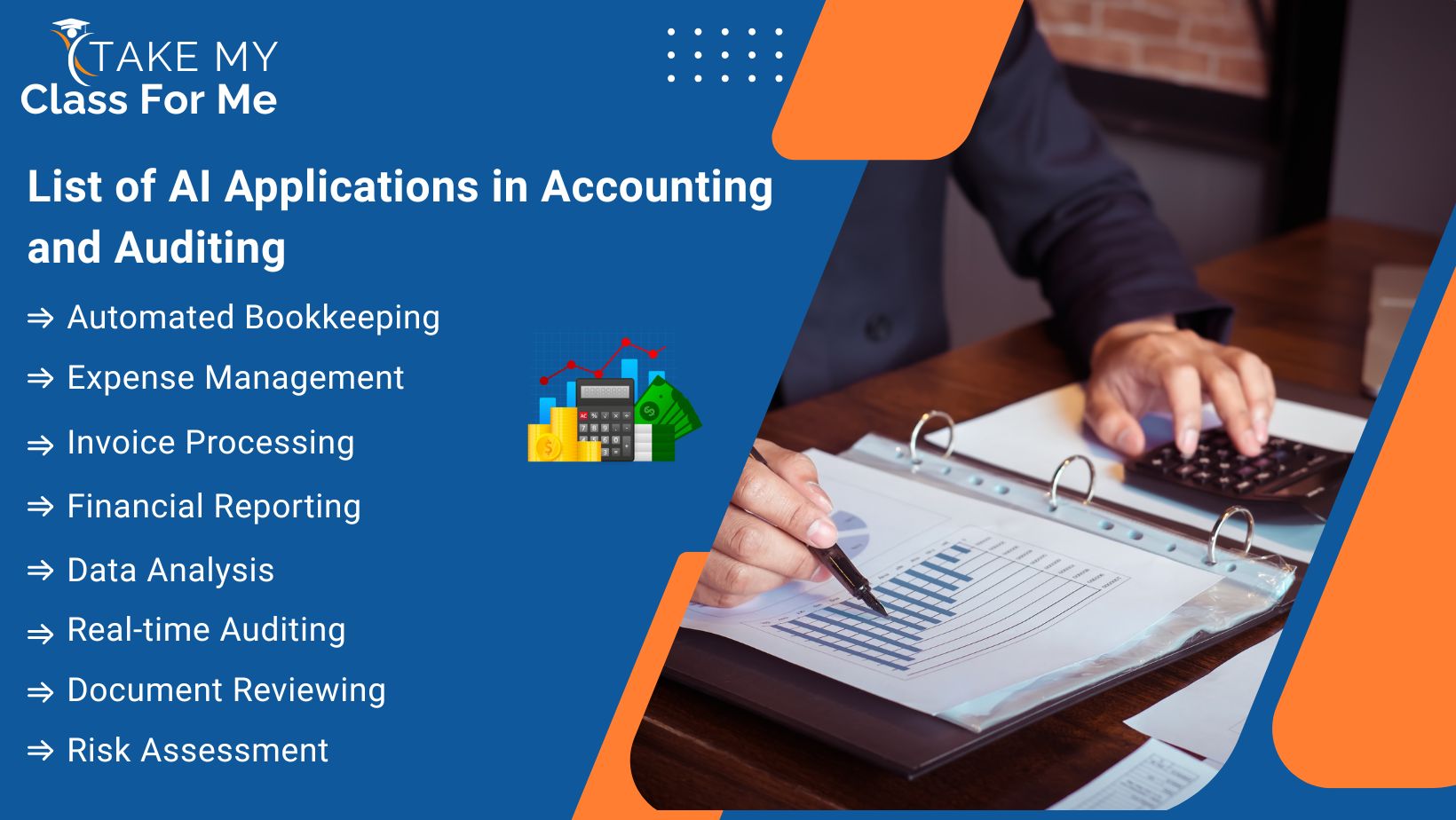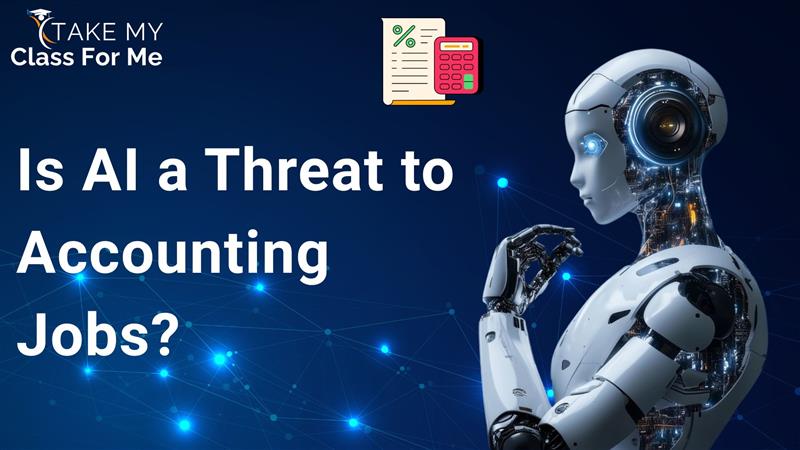Is AI a threat to accounting jobs? Not entirely. While AI will automate routine tasks, it will also create new opportunities for accountants to focus on high-value tasks like strategy, advisory, and complex problem-solving. This will make the job of accountants more efficient and valuable.
Artificial Intelligence (AI) is rapidly changing the world and taking over many tasks that humans used to do. It is already helping with boring and repetitive jobs that people often get tired of. Specifically, in many industries, including accounting, AI is becoming more powerful and capable of doing tasks that professionals used to handle. For example, in the field of accounting, AI can analyze financial data, manage expenses, and even create paychecks. But this leads to a question -“Is AI a threat to accounting jobs?” If you also have the same question in your mind, then read this blog to find the answer. In this blog, we have shared the benefits of AI in accounting. Additionally, we have explained how AI might impact the accounting profession and whether it is a good thing or a bad thing for accountants in the future.
The Rise of AI in Accounting and Auditing
The application of Artificial Intelligence (AI) in accounting and auditing dates back to the distant past. Previously, applications such as spreadsheets (e.g., MS Excel) and accounting software (e.g., QuickBooks) have made a substantial difference by performing accounting-related processes such as financial reporting and data entry automatically.
Subsequently, cloud-based accounting software such as Xero, FreshBooks, and Sage enabled accountants to access information anywhere and work online in real-time. This facilitated easier and more effective accounting.
However, in recent times, AI software has revolutionized the field of accounting. Particularly, software such as Expensify assists in data entry, and software such as CaseWare IDEA identifies fraud and anomalies in financial information. Furthermore, all the Big Four accounting firms (Deloitte, PwC, EY, and KPMG) have incorporated AI in their audit procedures. They all utilize software such as machine learning and automation to increase the efficiency and accuracy of audits.
For instance, Deloitte employs Argus to review contracts and leases, and PwC employs Halo to detect risks in financial reports. EY’s Canvas platform connects auditors and clients in real time. KPMG’s Clara platform offers clear and actionable insights.
These companies have experienced significant advantages from applying AI, such as increased efficiency, enhanced fraud detection, and more sophisticated decision-making.
List of AI Applications in Accounting and Auditing

AI creates a big impact on accounting and auditing by making many tasks easier and more efficient. Here, let us look at the real-time AI-based accounting and auditing applications
- Automated Bookkeeping: AI software such as Botkeeper and Receipt Bank (now Dext) assists with data entry, categorization, and reporting.
- Expense Management: Solutions such as Expensify automate scanning receipts and expense reporting. It makes it thus simple for individuals and big firms to track expenses.
- Invoice Processing: AI systems such as Tipalti process accounts receivable and payable. They also process invoices and match them against records to avoid duplicate bills.
- Financial Reporting: AI produces automated reports and insights in real time with a lot less human interaction. It primarily employs machine learning and natural language processing to achieve this.
- Data Analysis: AI processes huge amounts of data to spot anomalies and fraud potential. It commonly employs predictive models to detect risks.
- Real-time Auditing: Tools such as MindBridge AI Auditor audit financial information in real-time. They also identify issues and anomalies in real-time.
- Document Reviewing: AI software, such as Kira, reads and analyzes contracts and financial reports.
- Risk Assessment: AI enhances risk assessment accuracy with the help of predictive analytics. In addition, it points out likely threats by labeling financial activity with risk scores.
Advantages of AI in Accounting and Auditing
The influence of AI on accounting jobs can be dramatic, but it also has a lot to offer. Below are some benefits of AI in accounting and auditing
- AI enables accountants to work more effectively by taking over routine activities. This allows their time to be used for more strategic operations.
- AI eliminates errors in data processing. Financial records, therefore, become more precise.
- By automating routine procedures, organizations can lower their cost of operations.
- AI performs better at detecting fraud compared to humans. It accomplishes this through the discovery of hidden patterns and subtle anomalies that would otherwise not be detected.
- AI can seamlessly manage volumes of financial data as the business expands.
- AI analytics gives insights into financial data more extensively. This allows accountants to provide improved financial counsel and make informed decisions regarding shifts in market patterns.
What are the Challenges of AI in Accounting and Auditing?
Here are the limitations of AI in accounting and auditing
- In complex situations, AI cannot make ethical decisions like a human.
- AI works well only when the data it uses is accurate and fair. If the data has errors or bias, AI can make unfair decisions.
- AI struggles to understand unusual cases or the unique needs of clients and may interpret them wrongly.
- Using AI in accounting can be risky because it may lead to data leaks or cyberattacks involving private financial and personal information.
- AI systems struggle to keep up with changing financial regulations.
- AI still needs people to validate and approve its output to ensure its accuracy.
Will AI Take Over the Jobs of Accountants?
AI has made big improvements in accounting and auditing, but it still cannot take over the full role of a human accountant. Several accounting tasks still require human judgment, understanding, and approval before they are finalized.
These are some major reasons why humans are needed to perform accounting jobs
- AI cannot build relationships or give personal advice like a human can. Moreover, the majority of the clients prefer talking to someone they trust.
- Only humans can clearly and thoughtfully guide clients through tax issues, business challenges, and financial planning.
- AI has trouble with unclear or unusual situations, but humans are better at solving tricky or unique problems.
- AI does not understand morals or values. So, humans are necessary for making decisions that involve ethical reasoning and moral judgments.
- AI can forecast trends. But human creative thinking is essential for high-level planning and business strategy formulation.
- Communication, leadership, and teamwork are key parts of accounting. Machines cannot replace these soft skills.
What is the Future of AI in Accounting Careers?
The future looks very positive for accountants who use AI. Instead of competing with AI, they should use it to handle routine and repetitive tasks. This will free up their time to focus on more important work like guiding others, planning strategies, and evaluating results. By doing this, accountants can become even more valuable in their roles.
- As AI becomes more common in accounting, new job roles, such as AI Accountant, Data Analyst, Auditor, and AI Compliance Officer, are appearing.
- Future accountants should learn about AI tools, data analytics, and blockchain to stay ahead.
- Accountants need to keep learning and updating their skills to work effectively with AI.
- AI and humans should work together, not against each other, to get the best results.
- When humans and AI collaborate, they can drive innovation, provide valuable insights, and create a strategic plan for businesses.
Final Words
Is AI a threat to accounting jobs? The simple answer is No! AI is changing the field of accounting and auditing by automating many tasks, but it cannot replace human skills. Accountants are still needed for making ethical decisions, building client relationships, and creating smart business strategies. The future of accounting will be a mix of both humans and AI working together. If you wish to start your career in the accounting field, then you must have a strong knowledge of using AI tools. In case you lack the necessary knowledge, send us a ‘take my accounting class for me’ request. The accounting experts from our team will handle your coursework and help you in widening your subject comprehension.





